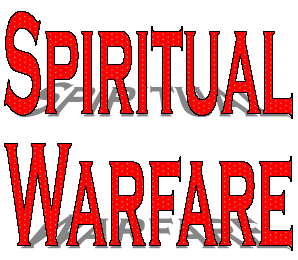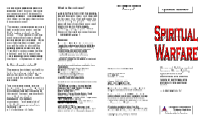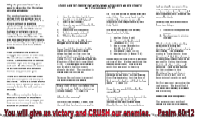
| ||
|
Book Catalog Tracts Catalog Retail Store Bible Resource Store Energion Publications |
||
Participatory Study Series Pamphlets
Christian Tract: Spiritual Warfare
|
|
Other formatsSpiritual Warfare is available in PDF format and Word document format. You can find our permission to print these pamphlets at the Participatory Study Series index.
|
|
We are not fighting against humans. We are fighting against forces and authorities and against rulers of darkness and powers in the spiritual world. - Ephesians 6:12 |
Why do you use "war" as a way to describe the Christian life and struggle?
The spiritual warfare metaphor comes from the apostle Paul in Ephesians 6:10-20. Because it is always difficult to describe spiritual things in the terms of our physical world, the Bible uses a number of different ways of describing our struggle and the conflicts of the Christian life. We also see descriptions from nature, from the family, from agriculture, from business and from athletic events.
Most Christians are aware of struggle and conflict in their lives. We can all see conflict in the world. Sometimes this is conflict between right and wrong, good and evil. At other times it seems to be just conflict and struggle without any particular goal.
There is a conflict between good and evil that spans the history of the world. There is a great drama built on God's desire for good, our enemy's desire for evil, and our choices.
The military metaphor helps us answer a number of important questions about this struggle and how we are to carry it out in the bounds of Christian love.
- Has the decisive battle been fought or is it still future?
- Who is the enemy?
- How do we avoid friendly fire casualties?
- What are our weapons?
- Is this struggle violent?
- What is the outcome?
Has the decisive battle been fought or is it still future?
Jesus fought the decisive battle when He was here as a man. When he died on the cross he declared that everything was done (John 19:30). He preached that the Kingdom of God had come (Mark 1:15). Our struggle is to finish a war in which the outcome is already decided. The question is which side we will be on.
Because the outcome is assured, we don't need to be afraid.
| Every child of God can defeat the world, and our faith is what gives us this victory. - 1 John 5:4 |
Who is the enemy?
We have one enemy, Satan, and the evil that he does to us and in us. We are called to resist him and reject him. Our most basic tool in resisting the enemy is our will, subject to and empowered by the Holy Spirit.
We must recognize our enemy. Here's what he's like:
- He lies (John 8:44)
- He perverts God's word (Matthew 4:1-10)
- He accuses (Revelation 12:10, Job 1 & 2)
- He steals (John 10:10)
- He destroys (1 Peter 5:8)
Notice that we don't have a physical picture of him. Rather we know the nature of his work. And it is his work that we want to destroy.
| Anyone who keeps on sinning belongs to the devil. He has sinned from the beginning, but the Son of God came to destroy all that he has done. - 1 John 3:8 |
How do we avoid friendly fire casualties?
In recent years we have learned the phrase "friendly fire" which describes fire that comes from friendly forces, but is nonetheless just as deadly as enemy fire. This is one of those phrases we have taken from "war talk" that describes the Christian life very effectively.
Friendly fire casualties result from two things:
- Failure to recognize the enemy
- Carelessness in aiming our fire
What we hate is the sin, the thing that is doing the damage, not the sinner, who is the victim. The common saying is "hate the sin, love the sinner." But this phrase is so frequently often used as an excuse for hating the sinner, that it will often not be well received. Part of the reason for this problem is that Christians have not known how to attack evil, and so have injured people as well.
So first we must recognize the real enemy. We know that if we think the enemy is human we are wrong.
What are our weapons?
Our weapons are spiritual. When we look at our arsenal, we are again reminded that our enemies aren't human, because our weapons aren't designed to destroy humans. Just remember that they can be very destructive if improperly used!
|
14Be ready! Let the truth be like a belt around your waist, and let God's justice protect you like armor. 15Your desire to tell the good news about peace should be like shoes on your feet. 16Let your faith be like a shield, and you will be able to stop all the flaming arrows of the evil one. 17Let God's saving power be like a helmet, and for a sword use God's message that comes from the Spirit. - Ephesians 6:14-17 |
Is this struggle violent?
The enemy be violent and will try to try to make us violent so we will do his work for him. We must resist his method as well as his works.
|
3We live in this world, but we don't act like its people 4or fight our battles with the weapons of this world. Instead, we use God's power that can destroy fortresses. We destroy arguments 5and every bit of pride that keeps anyone from knowing God. 2 Corinthians 10:3-5a |
What is the outcome?
|
God's home is now with his people. He will live with them, and they will be his own. Yes, God will make his home among his people. 4He will wipe all tears from their eyes, and there will be no more death, suffering, crying, or pain. These things of the past are gone forever. - Revelation 21:3, 4 |
Resources:
Pacesetters Bible School's ministry is to "equip the ordained and laity to build the Kingdom of God". This includes classes, conferences, and weekend seminars
- Bible Study and the Holy Spirit
- Prayer, personal and corporate
- Spiritual Warfare, God's Victory
- Spiritual Gifts and the Church
- subjects chosen by the needs of the local church or group.
We also have publications available from Energion Publications:
- Prayer Scriptures for Prayer Warriors
- Self-Defense for Prayer Warriors
- Repentance and Rejoicing
- 7 Barriers to Hearing the Word
- 7 Kingdom Principles of Choice
- Offering Peace and Forgiveness
![]()
as well as our recommendations from other authors
- The Beginner's Guide to Spiritual Warfare. Anderson, Neil T. and Timothy M. Warner. Servant Publications. 2000. ISBN 1-56955-206-1
- Intercessory Prayer. Sheets, Dutch. Regal Books. 1996. ISBN 0-8307-1900-8
- Watchman Prayer. Sheets, Dutch. Regal Books. 2000. ISBN 0-8307-2567-9
- The Word and the Spirit. Cain, Paul and R.T. Kendall. Creation House. 1998. ISBN 0-88419-544-9
- Who's Afraid of the Old Testament God? Thompson, Alden. Energion Publications, 2003. ISBN 1-893729-07-9. (Especially Chapter 2). You can also purchase this book via Amazon.com Who's Afraid of the Old Testament God? (purchase from Amazon.com.
Energion Publications
P. O. Box 841
Gonzalez, FL 32560
Phone: (850) 525-3916
Web: Energion Publications (http://energion.com)
E-Mail: pubs@energion.com
This brochure is available in quantity. Contact Energion Publications for more information.
All scripture quotations taken from the Contemporary English Version, Copyright © 1995 American Bible Society.
Copyright © 2001, Henry E. Neufeld


